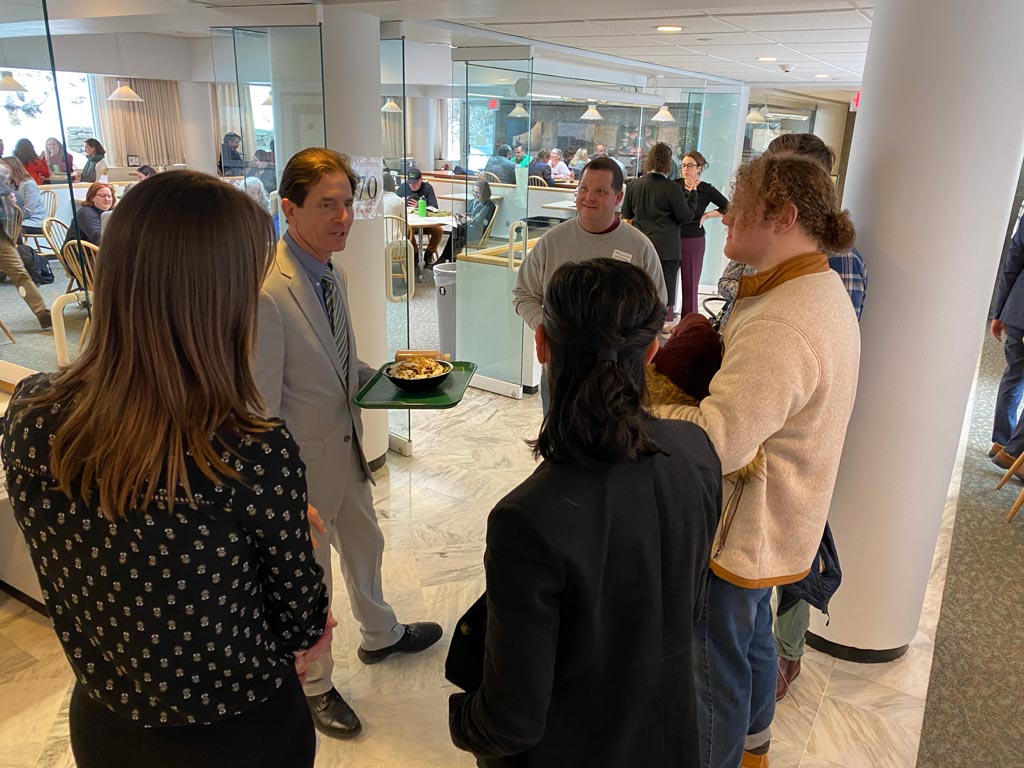SNAP Awareness Day 2024

On Tuesday, January 30th a group of advocates and community members met at the Statehouse in Montpelier for SNAP Awareness Day—a day to educate Vermont leaders and policy makers on the importance and suggested improvements to SNAP, a federal food security program known as 3SquaresVT here in Vermont. SNAP Awareness Day goes beyond raising awareness about SNAP as a stand-alone program. It is an opportunity to raise awareness about how SNAP complements and works alongside all food access programs available to people living in Vermont.
SNAP (which is short for Supplemental Nutrition Assistance Program) is the most effective anti-hunger program in the country, and our state, with approximately 40,000 Vermont households currently enrolled. It provides money to purchase food from retailers, grocery stores, and farmers markets. Each year, SNAP brings $110 million federal dollars into the Vermont economy.
On SNAP Awareness Day, a diversity of stakeholders (ranging from people who receive SNAP benefits to food access advocates) educated legislators and connected with their local representatives to demystify all things SNAP; plus, folks shared about additional statewide food access programs that complement SNAP.
Here at Vermont Foodbank, we are grateful to the many community members, network partners, and fellow advocates who joined us to share. Stakeholders gave perspective on topics such as: how SNAP can change lives, its challenges and ways to improve access, the impact of related programs like Crop Cash and food shelves, and how SNAP is administered in Vermont. Everyone spoke with vulnerability and deep care.
Matthew Carey, a Brattleboro resident and employee of Foodworks (a local food shelf), testified to the House Human Services Committee: “Food insecurity is deeply significant to me. I’m no stranger to going hungry…food stamps have been a constant throughout my life. My father only worked sporadically so it was usually our only budget for food except for occasional trips to food shelves.” He shared a reflection from his work: “Being there [at Foodworks] allowed me to see how much of a burden, financially and emotionally, food insecurity was on people. And how heavily they relied on their SNAP benefits and how that program was coming up short…people in my community had to rely on different sources for food like local soup kitchens and the Crop Cash program allowed food stamps to go further than they normally would…[people] were struggling just as badly as I was and trying to keep themselves and their families afloat…programs like ours [at Foodworks] help people immensely but they can’t do everything.”
Matthews’s story illustrates the complexities of food insecurity and both the strengths and weaknesses of SNAP. It also demonstrates why supporting other impactful food access programs is vital to ensuring all people living in Vermont have access to the food they need. On SNAP Day, a number of tangible solutions to address food insecurity were proposed to legislators:
- Support S. 215 and H. 703, legislation supported by Sen. Ruth Hardy and Rep. Jubilee McGill, which seek to establish a Restaurant Meals Program for SNAP participants in Vermont and direct the state SNAP agency to produce a transition plan to increase the SNAP minimum benefit amount for all participants. If passed, this exciting new legislation will help expand what people can buy with their SNAP benefits and will increase the minimum benefit amount that applicants can be approved for—with current policies this can sometimes be as low as $1/month. Here is an article with more info and testimony from Rep. Jubilee McGill.
- Support Vermont Foodbank’s request for $5 million in base funding to purchase food and provide financial support to local community partners. As many people who shop with SNAP benefits run out before the end of the month, ensuring the Foodbank can supply enough food to partners statewide is an important supplement for people, especially folks who are currently only getting a minimum SNAP benefit.
- Support the Meals on Wheels request for $2 million in base funding to the Vermont Area Agencies on Aging to support the increased demand for food and meet the nutritional needs of the growing demographic of older Vermonters.
- Support the NOFA-VT request for $478,500 in base funding to support their food access programs Crop Cash (a coupon program that gives coupons to people shopping at farmers markets with their SNAP benefits) and Farm Share (a program that provides discounted weekly vegetable shares).
How Can You Support Food Access in Vermont?
All people living in Vermont can help our legislators and policy makers better understand how food access programs work, why they are important, and how we can work together to improve them so that no one in Vermont is hungry. Here is how you, too, can support food access in Vermont:
- Read more:
- Watch SNAP Awareness Day Testimony:
- Contact your legislator:
- Visit the Vermont Legislature’s website to find your legislator (search by town) and their contact information.
- Share with them why improving food access matters to you.
- You could also include a link to testimony from SNAP Day (see above).
- Share your story:
- Use this webform to share how SNAP benefits and other food access programs impact your life or share your suggested improvements.
- Support the Foodbank:
And don’t forget! If you would like to learn more about SNAP benefits or would like help applying, contact our SNAP/3SquaresVT team: call us at 855-855-6181, text VFBSNAP to 85511, or email 3svt@vtfoodbank.org.
